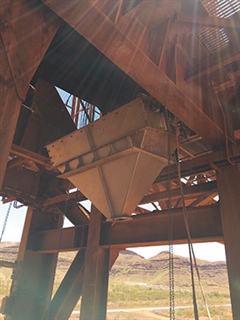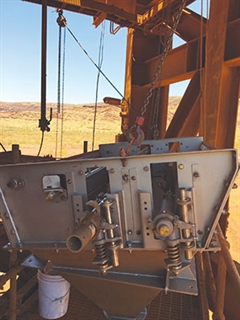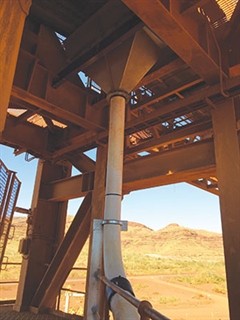Flexco Washbox Reduces Carryback, Spillage, and Downtime at Iron Ore Hub in Western Australia

Industry
Iron Ore
Application
5km Overland conveyor belt
Product
Flexco Wash Box
Objective
Reduce carryback
Reduce Spillage
Save labour hours
PROBLEM:
Located in one of the biggest iron ore hubs in the world, a mine site with belts running 24/7 was experiencing severe maintenance clean-up costs and associated labour time. This mine began its operation in May of 2013 in the Western Australian Pilbara region. The site includes a 120km rail spur to Port Headland mainline where their iron ore is then exported to the world. The site now has a mine life expectancy of 20 years. With the site looking for effective ways to boost productivity, the goal of eliminating carryback, belt wear, and cleanup costs was set. The site’s 5km overland conveyor had a belt width of 1800mm and ran constantly at 5mps. The belt conveyor system consistently had a large amount of material being carried back onto the underside of the belt and spread along the length of the conveyor. Their goal was to reduce that carryback, as well as belt wear and time spent cleaning the conveyor’s underside. Previously, the site had installed a number of primary and secondary cleaners in a bid to reduce the presented carryback issues. However due to the nature of the belt’s profile and wear over time, much of the material was making its way past the cleaners and continuing to generate excessive clean-up cost. The conveyor was carrying loads of more than 7500 tonnes per hour along the belt. There were multiple points on the conveyor where material carryback was becoming more prevalent, creating piles of recourse. The site was also finding that the belt had significantly less life than if cleaner systems were properly implemented.
SOLUTION:
After discussions between the site’s construction engineer and Flexco, it was decided that the best way to combat the excessive carryback was to install a wash box that was custom-engineered for the site by Flexco's in-house engineering team. The customisation allowed the wash box to be fitted seamlessly into the conveyor line without hindering existing construction. Wash boxes will typically offer cleaning efficiency not found in usual primary and secondary cleaners alone. Using a wash box is advised in applications where the conveyor must be very clean or when head-end cleaning is not enough. Mounted on the return side of the belt, the stainless steel wash box is fitted with a combination of pressure rollers, spray bars, and a recovery system, depending on the application. On site installation of the wash box for the operation was aided by extensive planning by the mine’s construction team.
 |
 |
 |
| Washbox Being Installed | Washbox Being Installed | Charge Pipe Leading to Sump |
RESULT:
The wash box results presented themselves immediately with an instant drop in carryback seen along the return side of the belt. Such a reduction in carryback and spillage increased the safety of the conveyor line. Less buildup along walkways and around the belt conveyor system drastically increased the site’s safety and created a reduction in manual clean up. However, the most impressive result of the project was the increase in belt life. After installing the wash box, the belt life has been extended an additional 9 months beyond the typical 3 year life. Recent site inspections suggest it will last an additional 3 months before change-out. Just on the cost of the belt alone ($3m) this provides a $250-330k cost savings every 4 years.
Reducing carryback and inherent spillage has also had an overwhelmingly positive effect on the environment with all spillage redirected into a dedicated sump.
The immediate results on the 1800mm belt led the mine to add a wash box onto their 1400mm belt as well, increasing the belt life by an additional 6 months so far. After the success of both wash boxes, the site plans to install another wash box and sump on the 1800mm belt, and on one of their other sites.
Product Group
- Belt Cleaning Systems
Industries
- Copper
- Iron Ore